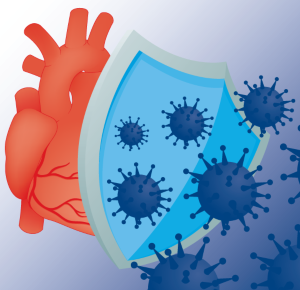COVID 19 Cardiac Damage - Nature
posted on
Apr 24, 2021 03:34AM


https://www.nature.com/articles/s41569-021-00550-3
COVID-19
Nature Reviews Cardiology (2021)Cite this article
507 Accesses
13 Altmetric
Researchers have identified a pathway associated with cardiac injury in patients with coronavirus disease 2019 (COVID-19). Inhibitors of this pathway prevented and rescued cardiac dysfunction in human cardiac organoids (hCO) and a mouse cytokine-storm model.
“It is becoming increasingly evident that patients with severe acute respiratory syndrome coronavirus 2 (SARS-CoV-2) infection can develop cardiac complications, and those with pre-existing cardiovascular disease are at greater risk,” comments first author Richard Mills. “We sought to understand how SARS-CoV-2 could be driving cardiac dysfunction through possible direct (cardiac infection) and indirect (inflammation or cytokine storm) means, observed in many patients,” he continues.

The effects on cardiac function of a range of pro-inflammatory cytokines that have been shown to be elevated in patients with COVID-19 were screened in a pluripotent stem cell-derived hCO model. A combination of IFN-γ, IL-1β and poly(I:C), which the researchers termed ‘cardiac cytokine storm’, induced the most consistent, robust diastolic dysfunction in the hCO model. Treatment with the cytokine storm cocktail induced increases in 91 phosphosites, including phosphorylation of signal transducer and activator of transcription 1 (STAT1) and two sites on bromodomain-containing protein 4 (BRD4). Furthermore, single-nuclei RNA sequencing of the hCOs revealed that the cytokine storm treatment induced a robust viral-like response in multiple cell populations that was predicted to be mediated via STAT1 and BRD4.
Strikingly, delayed injection of a bromodomain and extraterminal family (BET) inhibitor 1.5 h after lipopolysaccharide (LPS) injection fully prevented the decrease in cardiac function in an LPS-induced cytokine-storm mouse model. Furthermore, in a mouse model of SARS-CoV-2 infection, treatment with a BET inhibitor decreased the transcription of genes related to the viral response. “Using a number of omic-based approaches, we identified a therapeutically targetable mechanism, BRD4 activation along with a STAT1-mediated viral response, in which BET inhibition could prevent and recover cardiac dysfunction,” states Mills.
Finally, treatment with the commercially available bromodomain 2 (BD2)-selective BET inhibitor apabetalone reduced the cytokine storm-induced diastolic dysfunction and reduced angiotensin converting enzyme 2 levels and viral infection in cardiomyocytes. These data suggest that BD2-selective BET inhibitors are leading candidates for rapid clinical translation for the prevention of cardiac injury in patients with COVID-19.
“We believe that BET inhibitors are attractive candidates for many indications in which inflammation could drive cardiac dysfunction, including other viral infections, sepsis and myocarditis,” remarks Mills. “Owing to the lack of effective treatments for many of these diseases, BET inhibitors potentially have huge implications for patient care,” he concludes.